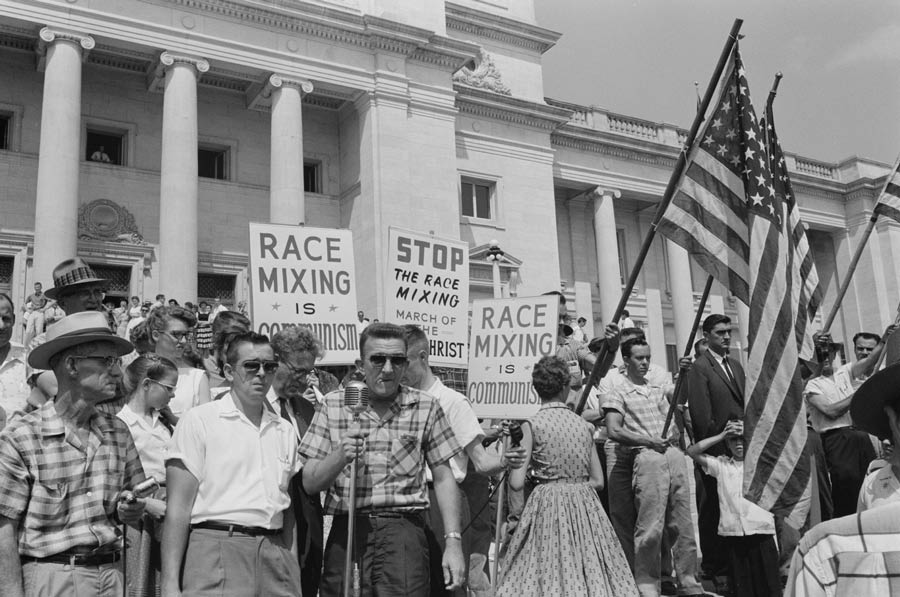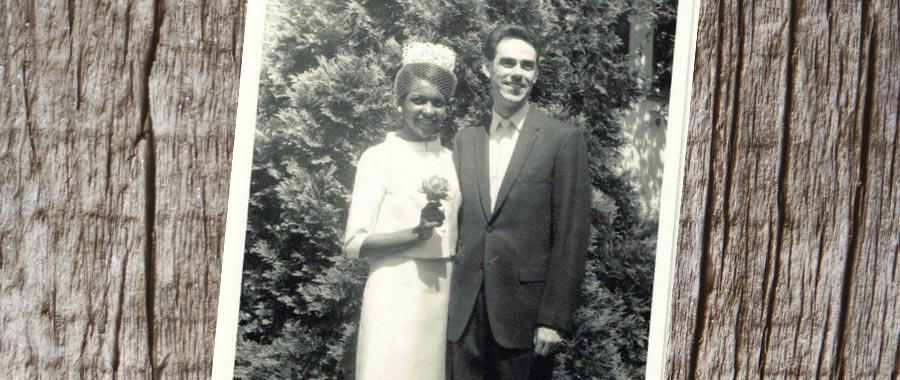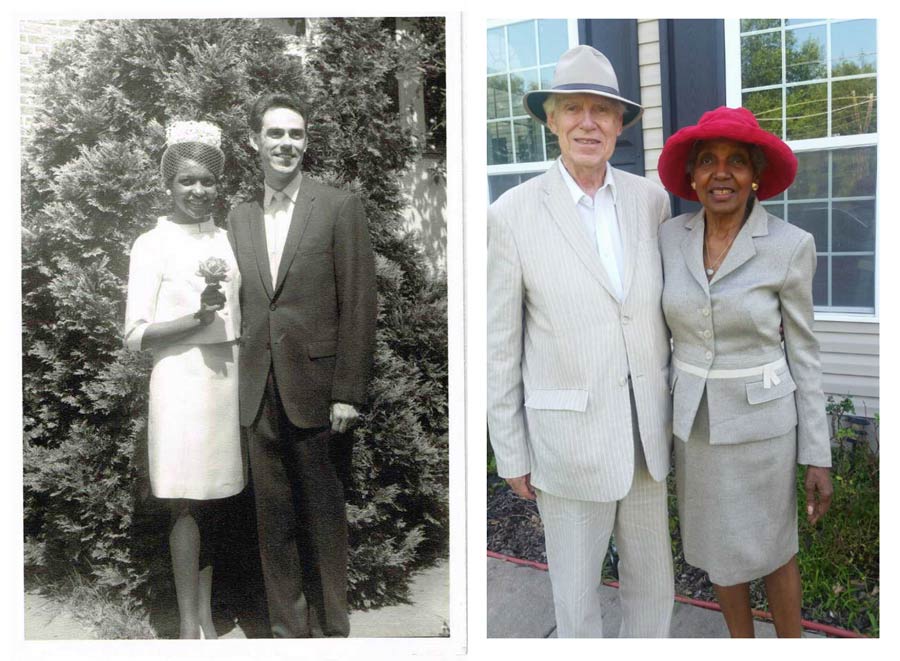The views expressed in our content reflect individual perspectives and do not represent the authoritative views of the Baha'i Faith.
Interracial marriage – illegal in the United States for more than two hundred years – only gradually became legal through the love of some of the brave couples who moved America towards acceptance.
The United States prides herself on noble ideals like life, liberty, and the pursuit of happiness, but for the Americans who fell in love with someone of a different color, those words rang hollow. Infamous and shameful miscegenation laws banned marriage across color lines in 1691, and continued to do so for several hundred years until American courts finally struck them down in 1967.

So for hundreds of years, the United States denied marriage – one of the highest expressions of love and unity, and one of the greatest sources of happiness – to those who fell in love with someone of a different color or racial classification. They did not have the liberty to pursue their relationship, due to the foundational laws of colonized America that promoted the antithesis of liberty and happiness for all: racism, oppression, segregation, and discrimination.
The Baha’i teachings illustrate the corrosive effect racism has had on American society. In 1938, Shoghi Effendi, the Guardian of the Baha’i Faith, wrote:
As to racial prejudice, the corrosion of which, for well-nigh a century, has bitten into the fiber, and attacked the whole social structure of American society, it should be regarded as constituting the most vital and challenging issue confronting the Baha’i community at the present stage of its evolution.
The ceaseless exertions which this issue of paramount importance calls for, the sacrifices it must impose, the care and vigilance it demands, the moral courage and fortitude it requires, the tact and sympathy it necessitates, invest this problem … with an urgency and importance that cannot be overestimated.
To battle this prejudice, every month I help my mom with the planning, hosting, and supporting of several open conversations in order to provide a safe, loving environment for people to connect and explore spiritual topics together. Since the Baha’i teachings describe racism as America’s most challenging issue, it was very important for us to focus on race this year, with topics such as the spiritual station of black people in this country, the social construction of race, and interracial marriage.
RELATED: Interracial Dating: Struggle and Success Stories
The Baha’i Faith, the only religion that encourages interracial marriage in its sacred texts, pivots around the oneness of humanity – one God, one human race, and one unfolding religious system. Baha’is understand, with only one human race, that no such thing as interracial love or interracial marriage actually exists, even though the wider culture has embedded those terms in our language.
The last gathering my mom and I hosted featured a panel of elderly interracial couples who talked about what it was like to get married when it was illegal in many American states. I was honored to hear the beautiful interracial love stories of so many revered elders in the Baha’i community who put the Baha’i teachings into action. Abdu’l-Baha, one of the central figures of the Baha’i Faith, wrote:
There is no greater means to bring about affection between the white and the black than the influence of the Word of God. Likewise marriage between these two races will wholly destroy and eradicate the root of enmity.
The panel of interracial couples warmed our hearts with stories about how they found the Baha’i Faith and, as a result, the loves of their lives. Their hearts were pure, their attitudes humble, and their demeanors sweet and kind. All their stories exemplify what to look for and work towards in a marriage, as their years of marriage ranged from 40 to 52.
RELATED: Interracial Marriage: Stories of Integration and Activism
The following love at first sight story was shared by two dear friends on the panel, Maxine (a Black woman) and Jim Oliver (a white man). They still remember in exact detail the moment they met. The year was 1964. She was 26 and he was 30:
Maxine (to the audience): “Well you know, we were both Baha’is. Glenford Mitchell (a former Universal House of Justice member) would give this program and every morning we would study Baha’u’llah and the New Era. That particular night, I came home and I was very tired, and my landlady’s grandchildren and her daughter had come over and she said:
Landlady: Oh Maxine, are you going to go to your program tonight?
Maxine: No, I’m not going tonight. I’m too tired.
Landlady: Oh Maxine, you should go. Tonight might be the night you meet your husband!
Maxine (chuckling): If I haven’t met him in all these years, I don’t think tonight is going to make any difference.
“To make a long story short, I went upstairs and took a shower and was going to sit and read, but I felt better after taking a shower. So, I did go and that was the night that I was standing there listening to this music (they always had music playing while they were waiting for people to come). I was listening to the music that somebody had put on the record player and I felt somebody staring at me and I turned around and it was Jim and I really literally felt something. You read all these storybooks about the lady feeling something go through her body and I literally felt that. I thought, ‘I wonder if that means he is going to be my husband?’”
Jim (to the audience): “I went to this Baha’i meeting, walked up three flights of stairs to the Baha’i Center that they were renting at that time, walked in this room, and saw this woman in black and red and this song kept going through my head while I was looking at her. It’s the song from South Pacific called Some Enchanted Evening:
Some enchanted evening, you may see a stranger,
You may see a stranger across a crowded room,
And somehow you know, you know even then,
That somehow you’ll see her again and again.
Some enchanted evening, someone may be laughing,
You may hear her laughing across a crowded room,
And night after night, as strange as it seems,
The sound of her laughter will sing in your dreams.
Who can explain it, who can tell you why?
Fools give you reasons, wise men never try.
Some enchanted evening, when you find your true love,
When you hear her call you across a crowded room,
Then fly to her side and make her your own,
Or all through your life you may dream all alone.
Once you have found her, never let her go,
Once you have found her, never let her go.“
Maxine: “So, we started to talk and whenever I was making comments or answering a question or something, somebody else would say something and Jim would say, “Well, I don’t think she meant that. I think she meant …” And it seemed like he could always sense what I was really putting across to the audience. So that was the night we met.”
Jim: “I dated Maxine for three years and fell in love quite rapidly … and boom, we decided to get married.”
Interracial marriage was illegal in Maryland at the time, so they got married in D.C. – where it was still illegal, but the law wasn’t enforced. Maxine and Jim Oliver later had two beautiful daughters and have been married for 55 years.
Abdu’l-Baha wrote:
I pray God that ye may at all times be in the utmost love and harmony, and be a cause for the spirituality of the human world. This union will unquestionably promote love and affection between the black and the white, and will affect and encourage others. These two races will unite and merge together, and there will appear and take root a new generation sound in health and beauteous in countenance.

















Comments
Sign in or create an account
Continue with Googleor